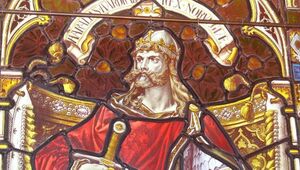Fleven the Glorious
| Fleven I Hamlet | |||||||||||||
|---|---|---|---|---|---|---|---|---|---|---|---|---|---|
| High King of Neuewland | |||||||||||||
A window in the Hamlet Palace depicting Fleven | |||||||||||||
| Emperor of the Zeevolk, First of the line of Ipiranis, Unifier of Neuewland, Xogh of Neuhamlet, Ghisern of Hamletsmunt | |||||||||||||
| Reign | 15th August 802 - 3rd May 835 | ||||||||||||
| Coronation | 15th August 795 | ||||||||||||
| Predecessor | Emperor Erenic VI Khepri | ||||||||||||
| Successor | Emperor Ghiner I Hamlet | ||||||||||||
| Born | Fleven Hamlet 15 March 784 Niit Hamletsmunt | ||||||||||||
| Died | 3 May 835 (aged 52) | ||||||||||||
| Burial | Mausoleum of the Emperors, Alethshaven | ||||||||||||
| Spouse | Kiita Hamkanne (m. 803-829); her death | ||||||||||||
| Issue | Emperor Ghiner Hifhya Anlighan | ||||||||||||
| |||||||||||||
| Dynasty | Hamlet | ||||||||||||
| Father | Grand Duke Tifan Hamlet | ||||||||||||
| Mother | Princess Ibina Khepri | ||||||||||||
| Religion | Sjaanism | ||||||||||||
Fleven the Glorious was the first High King of a reunified Neuewland following the complete collapse of the Sivuk Empire in the wake of the death of Emperor Erenic Khepri and led Neuewland through the succession wars among the many claimants to the throne. At the age of 18, he was coronated by the Torolamryma in Alethshaven, and would lead Neuewland into a golden age, which would be continued by his successor, Ghiner I Ipiranis.
His reign was marked by almost incessant warfare among the many now-independent Xoghan of Neuewland in the wake of the Sivuk Collapse, as well as the incursions from the Guurissi clans and invasions by foreign adventurers. As part of his campaigns to reunify Neuewland, he suppressed the fighting between Xoghan, fought off many raids and attacks from foreigners, and carved out the path for Neuewland to follow in the following centuries. In 832, he declared himself Xogh-Nya of Neuewland and declared the founding of the Ipiranis Bloodline.
After his death from a mangonel in 835, he was quickly succeeded by his son, who had been taught extensively by his father on how to rule, and whom led Neuewland through the rest of their golden age. He is honored throughout Neuewland today, and many consider him to have been a minor deity, with his lineage retaining parts of his divine soul.
